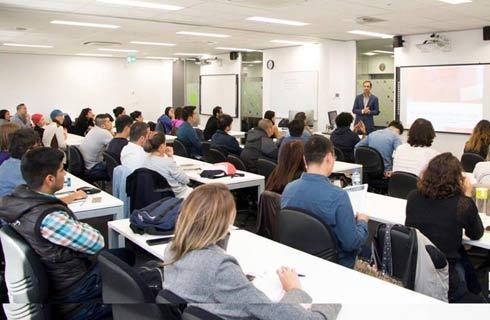理学硕士-营养科学
Master of Science in Nutrition Sciences

学历文凭
Masters Degree

专业院系
School of Integrated Health Sciences

开学时间

课程时长

课程学费

国际学生入学条件
All applicants must have a minimum overall undergraduate grade point average of 2.75 (A=4.0), or 3.00 (A=4.0) in the last two years. The Graduate Record Examination (GRE) is optional but may be used by the student toward admission (as evidence of quantitative abilities, and/or evidence of verbal abilities). Applicants to the Thesis Subplan are encouraged to provide the GRE scores for admission.
Clinical Nutrition & Dietetics Subplan applicants must also have 2.75 minimum GPA in the required sciences courses and DPND courses, separate from the total GPA.
English Proficiency:
Test of English as a Foreign Language (TOEFL): (Paper-based) Minimum score - 74; (Computer-based) Minimum score - 213; (Internet-based) Minimum score - 80
International English Language Testing System (IELTS): Minimum score: 6.5
Duolingo English Test (DET): Minimum score: 105
Michigan Test of English Language Placement (MTELP): Minimum score: 85
Pearson Test of English (PTE): Minimum score: 65
IDP—雅思考试联合主办方

雅思考试总分
6.5
- 雅思总分:6.5
- 托福网考总分:80
- 托福笔试总分:160
- 其他语言考试:Pearson Test of English (PTE) - Minimum score: 65
CRICOS代码:
申请截止日期: 请与IDP联系 以获取详细信息。
课程简介
The mission of the UNLV MS in Nutrition Sciences is to provide program graduates with the skills and knowledge to be comfortable and competent nutrition and dietetics professionals capable of providing excellent nutrition and dietetic services in numerous community, food service, management, and clinical settings. The program will provide an evidence-based curriculum with a translation to clinicalprofessional practice.<br><br>Learning Outcomes<br>Learning activities will:<br><br>Prepare students for professional practice with patientsclients with various conditions and in various settings.<br>Prepare students to implement the Nutrition Care Process with various populations and diverse cultures.<br>Use a variety of educational approaches (such as professional shadowing, role- playing, simulations, hands-on practice, problem-based learning, classroom and web-based instruction, laboratory experiences).<br>Provide opportunities for students to learn professional and ethical behaviors and expectations including ways to contribute to the nutrition and dietetics profession such as serving as future preceptors and mentors.
相关申请
 预科
预科 奖学金
奖学金 实习机会
实习机会 在校学习
在校学习 跨境学习
跨境学习 校园授课-线上开始
校园授课-线上开始 在线/远程学习
在线/远程学习
开学时间&学费
学费信息仅供参考,请与IDP联系以获取详细信息
| 开学时间 | 时长 | 学费 | 地点 |
|---|---|---|---|
| 暂无 | 暂无 | 暂无 | 暂无 |
学校排名

世界排名601
数据源:
泰晤士高等教育世界大学排名
关于内华达大学拉斯维加斯分校

内华达大学拉斯维加斯分校(UNLV)成立于1957年,至今已发展成为美国领先的研究机构和高等教育中心之一。大学拥有超过25000名本科生,其中许多学生是家里第一代大学生--他们父母之前都没有获得过大学学位。该大学以其多样性而闻名--有来自85个国家/地区的超过1000名国际学生在该机构就读。该分校还有100多个文化、种族或宗教性质的学生组织,学生可以在这些组织中认识类似背景的人,帮助学生感到更融入。学生们身处于拉斯维加斯热闹的气氛中,大学确保那些希望住在校园或附近的学生有很多令人兴奋的机会。对于想要宁静景观的学生来说,坐短途汽车就可以欣赏沙漠景观,为他们提供远离城市灯光的足够的休息空间。该大学有16个主要学院,提供广泛的学习课程选择。该大学还以其 ''酷学术"科目而闻名--最现代的专业或学习领域的组合,确保学生处于现代学习的最前沿。UNLV不仅仅有优秀的教学质量,而且还采用多样化的现代方法,确保学生处于所选领域的最前沿。该大学的学生支持服务非常优秀,各种服务确保学生不会因为个人问题而分散学习精力。该大学还为任何关心教育对财务影响的人提供了很高的性价比-2020-2021年,87%的UNLV本科生获得了财政援助和奖学金。
本校相关课程
其他相关课程

营养传播学健康科学硕士(选择二)
 多伦多都会大学
多伦多都会大学学历文凭
Masters Degree
开学日期
课程费用总额


营养与食品应用科学学士学位
 多伦多都会大学
多伦多都会大学学历文凭
Bachelor Degree
开学日期
课程费用总额


食品,营养与健康科学学士学位-食品与营养科学
 不列颠哥伦比亚大学
不列颠哥伦比亚大学学历文凭
Bachelor Degree
开学日期
课程费用总额


营养科学哲学博士
 多伦多大学
多伦多大学学历文凭
Ph.D.
开学日期
课程费用总额


营养科学理学硕士
 多伦多大学
多伦多大学学历文凭
Masters Degree
开学日期
课程费用总额


营养科学理学士学位
 多伦多大学
多伦多大学学历文凭
Bachelor Degree with Honours
开学日期
课程费用总额










 美国
美国





